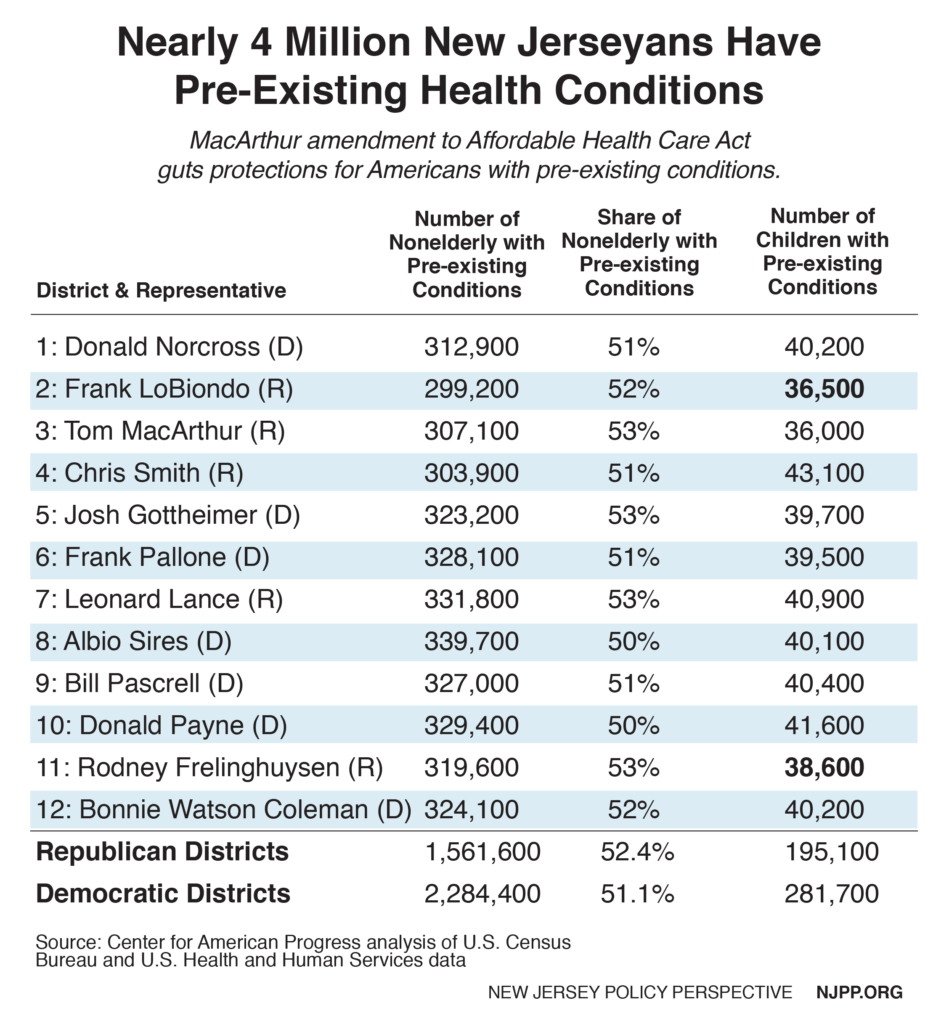To read a PDF version of this report, click here.
Rep. Tom MacArthur of New Jersey’s 3rd Congressional District – the only member of the state’s Congressional delegation who supported the first iteration of the American Health Care Act – has now resurrected the bill with a new amendment that retains all the worst elements of the original plan to repeal and replace the Affordable Care Act and sharply reduces protections for pre-existing conditions and other health benefits.[1]
New Jersey Still Harmed Much More Than Most Other States
Because the MacArthur amendment leaves most of the previous bill intact, in New Jersey the proposal would still cause:
- About a half million New Jerseyans to lose their health insurance[2]
- The phase-out of the Medicaid expansion, which would eliminate coverage for 562,000 residents and sharply reduce federal funds for the state’s budget
- Reduced health care for up to 1.8 million New Jersey seniors, people with disabilities and children due to a permanent cap on federal Medicaid funds that would reduce funding to New Jersey by 20 percent, the largest reduction in the nation
- An average $2,740 increase in out-of-pocket health care costs for 250,000 residents who have purchased insurance through the Marketplace, which would end coverage for many of them[3]
- Increased income inequality due to major tax cuts for 164,000 of New Jersey’s highest income households, including millionaire and billionaire residents
- The loss of tens of thousands of jobs with the loss of over $30 billion in federal funds over ten years
- A major financial threat to New Jersey’s hospitals
Amendment Also Guts Protections for Pre-Existing Conditions
The MacArthur amendment to the bill poses an even greater threat to New Jersey because it eliminates key protections for people with pre-existing health conditions and marks a return to the highly-flawed, discriminatory pre-ACA individual insurance market.
In practice, the amendment means that millions of people with pre-existing conditions could no longer afford coverage, women would likely be charged more than men for insurance, and plans could once again come with annual and lifetime limits on coverage – violating promises President Trump and many Republican legislators have repeatedly made to maintain these protections.
In New Jersey, there are an estimated 3.8 million non-elderly residents with pre-existing conditions. These New Jerseyans are found throughout the state, with hundreds of thousands in every Congressional District – including 307,100 in Rep. MacArthur’s district alone. In fact, a slightly higher share of Garden State residents in districts with Republican representatives (52.4 percent) have pre-existing health conditions than residents in districts with Democratic representatives (51.1 percent).[4]
Of these 3.8 million New Jerseyans, nearly half a million (476,800) are children – that means about one of every four Garden State kids (24 percent) have a pre-existing condition.
High-Risk Pools Haven’t Worked in New Jersey or Other States
Dropping these protections for people with pre-existing conditions would lead to exorbitant premium increases for many New Jerseyans. The MacArthur amendment proposes the establishment of a federal or state high-risk insurance pools – which combine the sickest people and provide a public subsidy to the insurer to partially reduce cost sharing – to address this problem. But in reality, these pools would do little to help.
The experience of many states shows that these pools frequently do not work, and often allow the sickest people to fall through the cracks. These pools have come with enrollment caps, long waiting lists, unaffordable premiums, exclusions for pre-existing conditions, high deductibles, benefit caps and annual and lifetime limits on coverage. Moreover, they covered only several hundred thousand people nationwide and weren’t sustainable over time because they pooled sick people with even sicker people.[5]
High-risk insurance pools haven’t worked in New Jersey, either. In the first year of the ACA, the state created a pool (called NJ Protect) with the help of a $140 million federal grant. In the end, the pool ended up enrolling less than half of one percent of New Jerseyans who were estimated to be eligible (1,500 of 256,000 New Jerseyans)[6].
And high-risk pools aren’t even intended to help people with many of the most common pre-existing conditions like asthma, hypertension, or depression. These New Jerseyans would be left to navigate the individual market, where insurers could once again charge them higher premiums, offer them subpar coverage or some combination.
Amendment Also Allows Waivers That Could Harm Millions
The other dangerous changes the MacArthur amendment makes are through the state waivers process: the proposal would allow states to move forward with potentially damaging waivers with practically no oversight. In fact, states would receive automatic approvals for these waivers within 90 days, just by attesting that their purpose is to lower premiums, improve coverage levels, or “advance another benefit to the public interest.”
The first type of waiver allowed under the amendment would allow states to opt out of the ACA’s “community rating” requirements – which prevent insurers from charging people higher insurance premiums based on their health – so long as they create or participate in a federal high-risk pool.
This means insurers could once again discriminate against people based on their medical history. Insurers could increase premiums without limits for anyone with a history of cancer, hypertension, asthma, depression or other conditions. While insurers would still be required to offer coverage, the so-called protection would be rendered meaningless since insurers could offer coverage with such arbitrarily high premiums that the effect would be to deny coverage outright.
The amendment would also allow states to waive the ACA’s “Essential Health Benefits” requirement that requires individual and small group market health plans to cover essential services like inpatient, outpatient and maternity care, prescription drugs, mental health and substance abuse treatment.
The result would be to effectively end protections for those with pre-existing conditions by allowing insurers to drop coverage for everything from cancer treatment to high-cost drugs. This would discourage more sickly persons with high-cost health problems from enrolling. So the more than 130 million Americans – including nearly 4 million New Jerseyans – with pre-existing conditions often wouldn’t be able to find individual market coverage that covers their needs at any price, much less an affordable one.[7]
On top of that, waiving Essential Health Benefits would mean:
- Women could again be charged more for coverage than men. While proponents claim that the MacArthur Amendment preserves the ACA’s ban on gender discrimination, eliminating Essential Health Benefit requirements means that women would have to pay more for plans that include maternity care and other key services – if they could find plans with those benefits at any price.
- Plans could impose annual and lifetime limits on coverage – including for people who get health coverage through their jobs. The ACA prohibits plans from imposing annual or lifetime limits on coverage – but only on coverage for Essential Health Benefits. Plans can still impose annual or lifetime limits on services not classified as essential. If states are allowed to eliminate Essential Health Benefits standards, plans could once again impose coverage limits on anything from emergency services to inpatient care to prescription drugs.[8] This would also effectively end the ACA’s cap on annual out-of-pocket costs, as that limit is based on the services that are covered by the plan.
Before the ACA, 3.3 million New Jerseyans with private health insurance – most of whom had employer-based plans – had policies that imposed lifetime limits on coverage. Repealing Essential Health Benefit requirements could mean going back to a time when millions of people with health coverage were one major illness away from medical bankruptcy.
Amendment Offers No Protections for People with Pre-Existing Conditions, Just Smoke and Mirrors
Despite Rep. MacArthur’s claim that his amendment maintains some protections for people with pre-existing conditions,[9] in practice it clearly doesn’t.
- Exorbitant premiums and coverage exclusions are no different than coverage denials. While insurers wouldn’t be allowed to deny coverage altogether to people with pre-existing conditions, they could offer plans that charge premiums of tens of thousands dollars per month and offer no coverage for hospitalizations, prescription drugs or various other basic health services.
- Pre-existing condition protections would once again rely entirely on state options. While states could keep or impose protections if they choose, they have always had this option – but few exercised it prior to the ACA. And many states are likely to opt out if they can. Since the AHCA would sharply increase consumer costs by eliminating the individual mandate and slashing subsidies, states would be under substantial pressure to seek waivers.
- High-risk pools are an inadequate substitute. High-risk pools have not worked in the past, and don’t even apply to people with the most common kinds of pre-existing conditions.
Endnotes
[1] The following is a summary of the amendment as reported by Politico: http://www.politico.com/f/?id=0000015b-8ab0-df96-a9db-dff115c30001
[2] New Jersey Policy Perspective, The ‘American Health Care Act’ Would Cause Nearly Half a Million New Jerseyans to Lose Health Coverage, March 2017.
[3] Center on Budget and Policy Priorities, House Republican Health Plan Would Mean More Uninsured, Costlier Coverage in New Jersey, April 2017.
[4] Center for American Progress, Number of Americans with Pre-Existing Conditions by Congressional District, April 2017.
[5] Kaiser Family Foundation, High-Risk Pools as Fallback for High-Cost Patients Require New Rules, January 2017.
[6] Rutgers Center for State Health Policy, Data for Planning a Temporary High Risk Health Insurance Pool In New Jersey, May 2010.
[7] Center on Budget and Policy Priorities, If “Essential Health Benefits” Standards Are Repealed, Health Plans Would Cover Little, March 2017.
[8] Brookings Institution, New Changes to Essential Benefits in GOP Health Bill Could Jeopardize Protections Against Catastrophic Costs, Even for People with Job-Based Coverage, March 2017.
[9] Rep. Tom MacArthur, About the MacArthur Amendment, April 2017.

